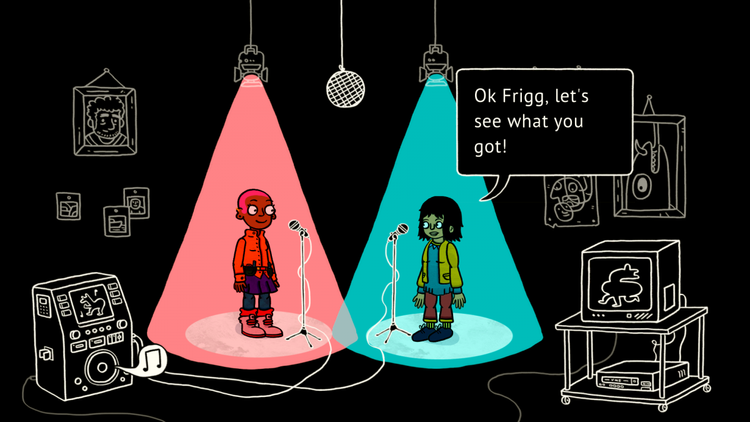We'll Always Have Our Stories Together

Since the indie boom of the 2010s, there have been a growing number of games that claim to incorporate class experiences. From Richard Hofmeier’s bleak small-business simulator Cart Life to Sundae Month’s sci-fi anti-adventure Diaries of a Spaceport Janitor, developers have attempted to interweave class themes into games ranging from realistic to fantastical. Effectively producing reverse-power fantasies, these titles highlight the oppressive capitalist systems and document their detrimental effects on the mental and physical wellbeing of those living under them.
However, as many critics have noted, class-inflected games carry with them a great deal of baggage. Although they allow players to occupy different class positions, usually with the intent of building empathy with lived realities, they are also commercial products predicated on entertainment. Titles such as American Truck Simulator are explicit about this objective, adapting a stereotypically blue-collar profession into a series of captivating road trips across America. Importantly, this genre of simulator games evade serious discussions of precarity in favour of an easily optimised path to wealth. Even Cart Life, despite rejecting the painless class tourism found in other titles, has faced accusations of gamifying precarity and poverty.
Triple Topping’s Welcome to Elk is an intriguing intervention to these stated issues, largely due to its unique approach. Described by its developers as a “biographical adventure”, the game is a cross between a walking simulator and an interactive documentary. Unlike similar titles, which either feature autobiographical elements or fabricated stories, Elk’s plot has been carefully adapted from oral histories. Triple Topping’s developers interviewed several people who lived and worked in isolated Nordic communities, weaving their testimonies together in a mostly-linear narrative. Each character, event, and plotline is effectively a pastiche of numerous lived experiences of poor and working-class folks living outside of the confines of so-called ‘civilisation.’
Despite its nuanced narrative development, Welcome to Elk’s overarching plot and gameplay loop are relatively straightforward. Frigg, a young carpenter, travels to the isolated Elk Island via boat to apprentice with the town’s handyman Jan. Each day, she inevitably gets distracted from her training by surprise events ranging from bleak tragedies to playful diversions. Each night, she experiences Lynchian dreams that ruminate upon her interactions with the small island’s community. Implied to be from a large-ish urban centre, players follow Frigg across three acts as she learns more about what everyday life is like for the island’s residents.
One of Welcome to Elk’s most notable features is its rapid oscillation between emotional highs and lows. Within the first few days, Frigg becomes acquainted with the island’s rampant alcoholism, completes arts and crafts with the kind-hearted but addled Anders, is sexually harassed by the reviled Leeroy, builds a Rube-Goldberg-esque squirrel trap, and helps dispose of the frozen corpse of one of the town’s inhabitants. This tonal whiplash is central to the game’s themes, demonstrating the unpredictable trajectory of life within an isolated and impoverished community. With little-to-no contact with the mainland, the residents of Elk Island must rally together to cope with trauma and find happiness amidst ongoing tragedies.
Unlike Cart Life and other simulation games, Welcome to Elk is unconcerned with having players manage resources or optimise game systems. This turns out to be a resoundingly good decision on behalf of the developers. Being able to ‘win’ in a class-inflected game runs the risk of reinforcing harmful tropes, such as the enduring belief that class mobility is achievable solely through hard work. Instead, the game mainly focuses around a simple question: how can an isolated community sustain itself with little help from the outside world?
The game’s emotional fluctuations are both enhanced and complicated by its playful aesthetic. Adopting a style akin to a children’s book, Elk’s key characters and objects are rendered in vivid hues while its scenery resembles an untouched colouring book. Seeing Frigg skip across wintery landscapes with a gait akin to a paper marionette imparts a sense of curiosity and exploration while also accentuating its more fantastical elements. The game’s setting often feels dreamlike—a surrealism that escalates as the narrative progresses.
In fact, while many class-based games claim to present authentic experiences, it is a persistent meta-awareness that makes Welcome To Elk’s approach unique. Though Frigg is sometimes directly involved with the game’s events—notably through intermittent minigames that range from singing with the island’s inhabitants to stitching up a gaping wound—she is predominantly a witness and a listener rather than a catalyst.
Her outsider status is first established through her introduction as a newcomer but, through a series of fourth-wall-breaking set pieces, it slowly becomes clear that she exists more as a vessel to convey stories to the player. Following climactic moments where she ostensibly played a pivotal role, she eerily discovers that she was simply re-enacting the experience of another person from a different time and place. Her actions are interpretations of tales that have already been told, from discovering a dead body in the snow to attending a funeral for a definitely-not-dead island inhabitant.
Frigg comments on this slow realisation, at first believing that something strange or even supernatural is occurring on the island. She discovers an increasingly large collection of mysterious bottles in her home, each one containing a written letter that uncannily describes past and present events. She runs into mysterious storytellers, who relay their experiences through recorded video testimonies before fading into the darkness. And every night she dreams of a boat filled with the island’s inhabitants, who dispense riddles about the afterlife.
As Welcome to Elk winds down, the artifice of the game becomes increasingly central to its narrative. Developers can be heard whispering behind the walls of a kitchen, characters bid farewell to Frigg despite her having no stated intention to leave, and the story culminates with a strange video journey through Triple Topping’s studios, where the game’s storytellers greet Frigg and deal her into a card game. Interestingly, as the game auto-saves frequently, there is no easy way to revisit the game’s stories. Frigg’s time on the island is fleeting, an intentional reminder of the ephemeral nature of the oral histories that serve as the foundation of the game’s narrative.
By exploring the boundaries of the medium itself, Welcome to Elk reminds players of the limitations of simulation and representation within games. There is no universally-shared experience of being working-class or poor, no stable archive of stories and histories, and no perfect way to communicate lived experiences to a broad audience. Almost every story in the game exists in multiplicities, with each manifestation adding a new perspective or nuance. And while there is certainly a great deal of truth to be found, as Jan reminds players in a surreal denouement, “sometimes a good story is all it ever was."
After playing through Welcome to Elk for the first time, I read a number of reviews that presumed that the game’s central theme was loss… a perspective that I don’t fully agree with. While loss, death, and absence are certainly central to the stories being told, I believe that the thread that weaves them together is instead resilience.
Elk Island’s inhabitants come together, for better and for worse, to confront the various challenges facing their community. Their stories are ones that have persisted through joy and tragedy, and will continue to be told and retold beyond the artifice of the game. And, perhaps most importantly, Welcome to Elk reminds us that these tales are by no means comprehensive. They can only ever offer a fleeting glimpse into experiences outside of our own.




